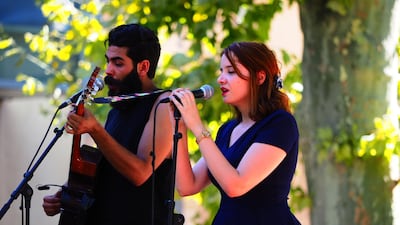Ahead of their show in Montpellier, France, today at Festival Arabesques – widely considered to be the premiere festival for Arab culture in Europe – Tunisian duo Yuma spoke to The National about their home country, music, politics and how they want their audience to feel when listening to their music.
Ramy Zoghlami and Sabrine Jenhani, both based in France, make melodic songs – played on acoustic guitar and drums – with a melancholic, haunting, dark feel, sung in deep, breathy vocals in Tunisian dialect Derja, although French rather than Arabic is their first language.
While they consider themselves a world-music act, their sound is very much indie-alternative, with a slight undertone of the Arab world and classical influences. Poetry is also a vital element of their craft and an influence that is clearly reflected in their lyrics. They say that they want their listeners to "feel free" when hearing their songs.
Since their start as a band in December 2015, they have released two albums: their debut, Chura, in 2016, and Ghbar Njoum (which translates to "Dust Stars"), released in March. Throughout those three years, Yuma have also toured globally in places such as Tunisia, Morocco, France and the UK.

In spite of the turmoil and political upheaval Tunisia has been through in the past few years, Zoghlami explains that the country's music scene is currently in rude health.
"It is in a state of effervescence," he says. "Young musicians are exploring their talents and freely expressing their state of mind through and thanks to music. I personally think that the music scene in Tunisia is starting to reach its peak and I am not complaining about it – on the contrary, I feel lucky to be part of it.
"Things have changed [in Tunisia], I can assure you that, for better or for worse. We, as Tunisians, are still discovering the meaning of freedom and exploring its different forms.
"The political scene in Tunisia took a more 'clear' path, let's say, after the revolution, but it did not help the cultural scene because it is still poor and not being really taken care of."
Jenhani adds: "The Arab Spring in Tunisia was the beginning of a new era, especially for artists. Since 2011, Tunisia has known an incredible boom of creativity starting with fine arts, theatre, music, cinema.
“All artists from all disciplines have been saying [out] loud what people where saying low for 23 years of [ousted president] Ben Ali.” she says. “It is still up until now – the new voice of freedom is the voice of the youth.”
Zoghlami and Jenhani differ in opinion about the intended effects of their music. Zoghlami is more on the poetic side, whereas Jenhani leans more towards nostalgia and emotion.
"It is not an option, actually. Zoghlami says. "It is my mother language, and I feel like our dialect is rhythmic and poetic. To be honest, I don't consider Arabic my mother tongue and I strongly believe that what I write and sing is somehow anthropological and participates in archiving our heritage in a way."
Jenhani adds: "It isn't shameful to feel nostalgia over someone or a place. I want them to feel safe, like the way they feel when they are with close friends. I want them to feel fully every emotion that has emerged, because it's true if it's there, and it's right to listen to our inner voices and let peace take place instead of ignoring them and live a lifetime tormented."
So what is the overall message that Yuma wish to convey to the world?
"I believe that the cause of all what is happening in the world, war, crisis, individualism and hypocrisy is hatred." Jenhani says. "It's all emerging from a sad fact, [which is] the lack of love and the fear of being rejected. The message I will always tell is that we all born in this world to be loved and to love and that is the message I want to share with the world."
Yuma perform on Thursday at the Festival Arabesques in Montpellier, France
_____________________
Read more:
Anarchy in the UAE: Sex Pistols bassist in ‘Never Mind the Opera’ line-up
Band reformations: is it ever a good idea to get back together?
A fresh approach: why musical side projects are about more than just having fun
Inspired by the Black Lives Matter movement, singers use music to make their voices heard
_____________________

